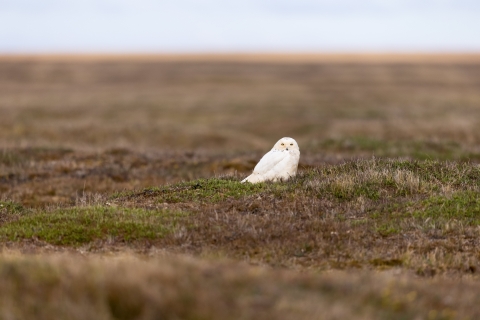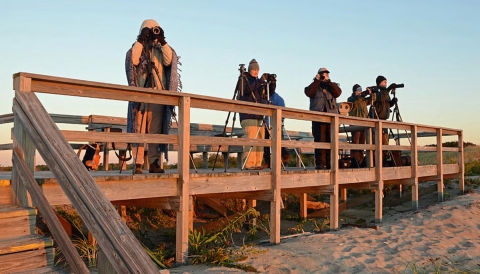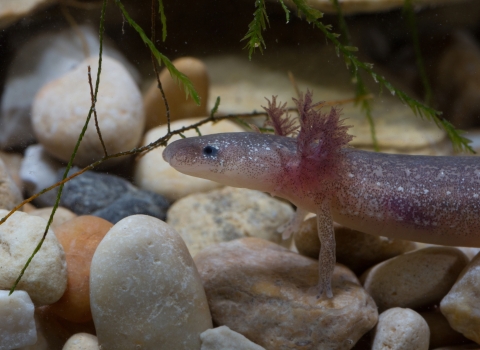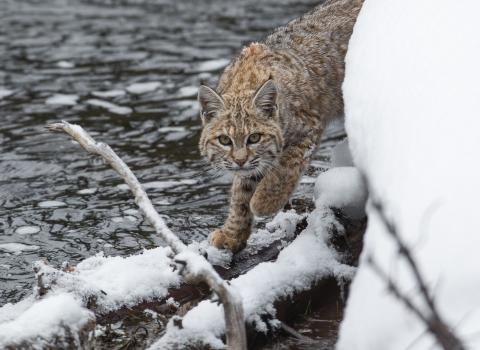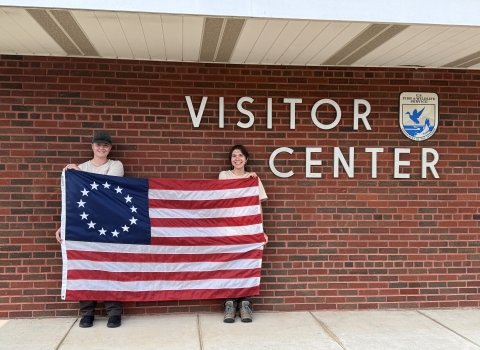There’s nothing like a balmy winter on the beaches of Plum Island, if you’re a snowy owl that is. Just as many of the island’s human residents head to warmer wintering grounds, snowy owls have begun to arrive from their breeding grounds in the Arctic tundra. It’s no surprise that snowy owl sightings tend to draw significant excitement from birders, wildlife watchers, photographers, and other recreational visitors from near and far. With their graceful bodies, expressive faces, and namesake snowy plumage, they’re a thrill to observe in the wild. In exchange, it is our collective responsibility to keep these majestic birds wild by practicing ethical wildlife watching behaviors.
Promoting ethical wildlife watching behavior is critical to our mission at Parker River National Wildlife Refuge. Our goal is to foster opportunities for inspiring wildlife encounters, while ensuring the many sensitive species that rely on the refuge for survival continue to have a safe place to thrive. We appreciate the many people who have reached out recently for tips on engaging in ethical wildlife observation, as well as how to talk with their friends, family, and other visitors when they witness unsafe behaviors. In response, we have compiled some best practices for wildlife watching at the refuge and beyond:
- Give wildlife space; 100 yards at least. Use binoculars or a telephoto lens instead of approaching closer. If an animal reacts to your presence, you are too close.
- Ensure wildlife always have a safe exit route by not surrounding them, and never follow animals when they leave for another area. This is a good indicator the animal is stressed and fearful.
- Limit your viewing time to no more than 10 minutes. If you are with a group, consider limiting your viewing time to no more than 5 minutes. This helps reduce stress to wildlife and allows other visitors a chance to share this unique experience.
- Avoid sharing real-time wildlife locations through social media, group chats, or other digital channels. This behavior can result in overcrowding that stresses wildlife and creates unsafe road and trail conditions.
- Never attempt to influence a wild animal's behavior by flushing, harassing, or playing recorded calls. These actions are illegal and can result in exhaustion and death, especially for birds with limited energy stores.
- Do not feed wildlife. Feeding wildlife is illegal and can make them sick, reduces their ability to hunt independently by creating a reliance on humans, and can result in the animal being euthanized if it becomes aggressive toward humans.
- Share these tips and why it’s important to give wildlife space if you witness unsafe behavior.
- Report wildlife crime by contacting the refuge office (978 465-5753), submitting a law enforcement tip online (https://www.fws.gov/wildlife-crime-tips), or calling 1-844-FWS-TIPS (1-844-397-8477).
Wildlife depends on all of us. In the winter of 2023, the refuge ultimately had to reduce public visiting hours due to unsafe behavior and wildlife harassment associated with two highly photogenic barred owls. Restricted visitor access is a last-resort action when other efforts to implement ethical wildlife watching behaviors have fallen short. By sharing these early reminders, we hope to avoid similar closures. We aim instead to foster a strong sense of communal responsibility to respect all wildlife, and the courage to speak up when we witness these behaviors from others.
Learn more at: https://www.aces-alliance.org/post/respecting-all-species-at-the-refuge

